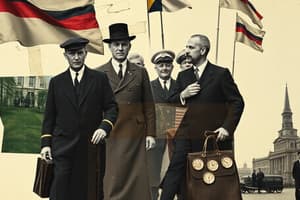Podcast
Questions and Answers
What was a significant impact of the war on the economy of Europe?
What was a significant impact of the war on the economy of Europe?
- Europe remained a creditor nation.
- Local economies flourished and expanded.
- Economic growth was stable across all countries.
- Countries transitioned from being creditors to debtors. (correct)
How were supporters of the Weimar Republic perceived in post-war Germany?
How were supporters of the Weimar Republic perceived in post-war Germany?
- They were highly respected and admired.
- They were considered heroes of the state.
- They gained popularity with the general public.
- They were viewed as weak and ineffective. (correct)
What event in 1923 exacerbated the economic crisis in Germany?
What event in 1923 exacerbated the economic crisis in Germany?
- France's occupation of the Ruhr. (correct)
- The signing of the Treaty of Versailles.
- The rise of the Communist Party.
- The establishment of the Weimar Republic.
What was a consequence of Germany printing paper currency without backing?
What was a consequence of Germany printing paper currency without backing?
Which uprising in Germany was inspired by the Bolshevik Revolution?
Which uprising in Germany was inspired by the Bolshevik Revolution?
Flashcards
Economic Crisis of Germany (1923)
Economic Crisis of Germany (1923)
The economic crisis deeply impacted Germany, leading to the refusal of paying war reparations and the occupation of the Ruhr region by France, further exacerbating problems.
Hyperinflation in Germany
Hyperinflation in Germany
The drastic devaluation of the German currency, leading to rapid price increases, making daily necessities unaffordable for citizens.
Nationalism and Instability in Germany
Nationalism and Instability in Germany
The failure of the Weimar Republic to stabilize Germany, leading to increased conservatism and aggressive nationalism. This was exacerbated by the glorification of soldiers and war propaganda, which highlighted national pride and honor.
Growth of Communism in Germany
Growth of Communism in Germany
Signup and view all the flashcards
Aftermath of WWI in Germany
Aftermath of WWI in Germany
Signup and view all the flashcards
Study Notes
War's Impact on Europe
- Europe suffered immense devastation from the war, including loss of life, destruction of cities, deep psychological trauma, and substantial economic damage.
- Europe transitioned from a creditor to a debtor nation, with shattered economies and once-powerful countries struggling to recover.
- The Weimar Republic in Germany, following its defeat, faced widespread criticism and accusations of weakness.
Weimar Republic and Political Unrest
- Nationalist groups exploited the Weimar Republic's perceived weakness, using it as a scapegoat for Germany's problems.
- The war elevated the status of soldiers over civilians, while aggressive war propaganda reignited national pride, hindering the Weimar Republic's quest for stability.
- The politically unstable period was marked by increased radicalism in Germany, concurrent with the Spartacist Uprising and the birth of the Communist Party of Germany. This uprisings were inspired by the Russian Bolshevik Revolution.
The Economic Crisis of 1923
- Germany's refusal to pay war reparations led to France's occupation of the Ruhr Valley, a critical industrial area in Germany.
- This occupation exacerbated Germany's economic woes, compelling them to print paper currency without backing, leading to runaway hyperinflation.
- The value of the German mark plummeted, and soaring prices made basic necessities unaffordable for the German population.
Studying That Suits You
Use AI to generate personalized quizzes and flashcards to suit your learning preferences.




